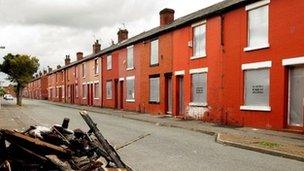MPs criticise 'disastrous' cuts to regeneration schemes
- Published

The Pathfinder scheme was designed to revive run-down parts of England
People have been "left stranded in appalling conditions" as a result of "disastrous" government cuts to regeneration projects, MPs have said.
The Communities and Local Government Committee said many were "trapped" in half-demolished streets after money for housing renewal schemes was stopped.
It said the government had "no adequate strategy" for regeneration in England and must help those left "trapped".
Housing Minister Grant Shapps said help was coming soon for the worst affected.
But he blamed the previous Labour government's "disastrous attempts at regeneration" for the current situation.
The cross-party committee focused on the decision to wind up the controversial Pathfinder housing renewal scheme last year.
The scheme was designed to revive run-down areas in the North West, the Midlands, the North East and Yorkshire by tearing down old terraces and building new homes.
But critics called it "an exercise in social cleansing" and said it had resulted in perfectly good houses being demolished - and often not replaced - when they could have been renovated.
'Terrible'
Labour chairman of the committee Clive Betts said the decision to end Pathfinder had left people "desperate".
"The houses have been emptied and boarded up for the most part, but there are still people left behind trapped in these areas," he said.
"They're living next door to boarded-up houses, unable to move, because there isn't the money to compensate them and there aren't the new houses to move into."
He said many of those affected were owner-occupiers whose only asset - their house - was all but worthless.
"[Their home] is no longer fit to live in, but equally they can't move out of it. It's a disastrous and terrible situation for these people."
Mr Betts said the City Challenge programme of the 1990s, which rejuvenated areas like Hulme in Greater Manchester, showed that if investment from the public and private sectors was combined and spent in the right way, the results could be impressive.
Chris Brown, from private housing regeneration fund Igloo, agreed that a mixture of private and public was the only way to improve these sorts of areas.
"These are places where the market has failed," he told the BBC. "These are actually the places where most of the people who were involved in the riots in the summer lived."
The committee said the government's regeneration strategy, published in January, provides "little confidence" that ministers have a clear plan of action.
"It lacks strategic direction and is unclear about the nature of the problem it is trying to solve," the MPs said.
"It focuses overwhelmingly upon the achievement of economic growth, giving little emphasis to the specific issues faced by deprived communities and areas of market failure."
'Untie the hands'
The MPs warned that current government plans were "unlikely to bring in sufficient resources" - including from private sector sources - to improve the situation, and leaving deprived areas without help risked storing up social, economic and environmental problems for the future.
In response, Mr Shapps said it had been "tough picking up the pieces" from Labour's attempts at regeneration which relied on "bulldozing buildings... whilst desperately hoping someone might come along to reorder the rubble.
"We'll shortly be announcing additional funding to help those people living in the worst-affected streets, and we'll continue to untie the hands of councils and residents so they can make the key decisions over how they would like to improve their own neighbourhoods," he said.
"But we know that true regeneration can only be achieved by creating the conditions for communities and businesses to thrive in.
"That's why local enterprise partnerships have already replaced the failed regional development agencies, and low-tax, low-regulation enterprise zones are being planted across the country to give businesses the incentives they need to grow their local economy and create thousands of new jobs."
- Published27 October 2010